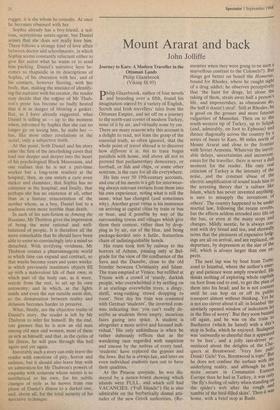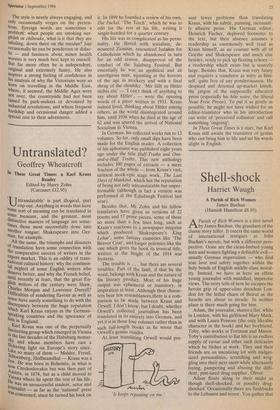Mount Ararat and back
John Jolliffe
Journey to Kars: A Modern Traveller in the Ottoman Lands Philip Glazebrook (Viking £8.95)
Dhilip Glazebrook, author of four novels"
and brooding over a fifth, found his imagination stirred by a variety of English, Scotch and Irish travellers' tales from the Ottoman Empire, and set off on a journey to the north-east corner of modern Turkey, none of it by air, and virtually none by car. There are many reasons why this account is a delight to read, not least the grasp of the essential truth, so often ignored, that the whole point of travel abroad is to discover how different it is, not to trace bogus parallels with home, and above all not to pretend that parliamentary democracy, or football, or fish and chips, or some other nostrum, is the cure for all ills everywhere.
He lists over 50 19th-century accounts, and one of his merits is a gift for interweav- ing always relevant extracts from them into his own experience, noting what is still the same, what has changed (and sometimes why). Another great virtue is his insistence on arriving at capital cities by train or bus or boat, and if possible by way of the surrounding towns and villages which give them their context, rather than by drop- ping in by air, out of the blue, and being package-herded into a futile, featureless chain of indistinguishable hotels.
His route took him by railway to the horrors of Athens, pausing only at Bel- grade for the view of the confluence of the Sava and the Danube, close to the old frontier between Christianity and Islam. The train emptied at Venice, but refilled at Trieste with a crowd of 'sturdy, darkish people, who overwhelmed it by settling on it as starlings overwhelm trees, a dingy, shrill, wing-rushing crowd dropping to roost'. Next day his train was crammed with German 'students', the inverted com- mas indicating that 'you can't really de- scribe as students those empty, incurious faces gazing into space. A student is altogether a more active and focused indi- vidual.' His only unkindness is when he rather dubiously reflects that as the wandering race regarded with suspicion and unease by the natives of every land, 'students' have replaced the gypsies and the Jews. But he is always fair, and later on even individual students turn out to have their qualities.
At the Piraeus quayside, he was dis- mayed by a notice-board showing which islands were FULL, and which still had VACANCIES. ('Full Islands!') He is also admirable on the barbarically dismal atti- tudes of the new Greek authorities. (Re- memner wnen tney were going to oe sucn a marvellous contrast to the Colonels?). But things got better on board the Homerus, bound for Rhodes, where he caught sight of a drug addict; he observes perceptively that 'the hunt for drugs, let alone the taking of them, steals away half a person's life, and impoverishes, as obsessions do, the half it doesn't steal'. Still at Rhodes, he is good on the grosser and more fatuous vulgarities of Mussolini. Then on to the south-western tip of Turkey, up to Selcuk (and, admirably, on foot to Ephesus) and thence diagonally across the country bY a series of buses to Kars, 80 miles north of Mount Ararat and close to the frontier with Soviet Armenia. Whatever the ine able delays, uncertainties and inconveni- ences for the traveller, there is never a dull moment for the reader. His only real criticism of Turkey is the intensity of the noise, and the constant abuse of the electric amplification of sound leads him to the arresting theory that 'a culture like Islam, which has never invented anything, is sure to misapply the inventions 01 others'. The country happened to be under martial law, following the recent revolts, but the effects seldom intruded into life on the bus, or even at the many stops and changes. Mildly ascetic, he is always con- tent with dry bread and tea, and shrewdly notes that the pleasures of expensive lodg- ings are all on arrival, and are replaced, on departure, by depression at the size of the bill, which is always larger than one ex- pects. The nexi. lap was by boat from Trebi' zond to Istanbul, where the author's ener- gy and patience were amply rewarded. He thinks nothing of exploring whole capitals on foot from end to end, to get the plan of them into his head; and he is not content until he can hop on or off its public transport almost without thinking. Yet he is not too clever about it all: in Istanbul the unwisely opened window of indecision let in the flies of worry'. But they soon buzzed off again, and he was on the train t° Bucharest (which he hated) with a day's stop in Sofia, which he enjoyed. Budapest, was 'outwardly so cheerful that it appeared to be free', and a jolly taxi-driver re- minisced about the delights of the Che; quers at Brentwood: 'Very fine Ptlh' Drink! Girls! Yes, Brentwood is tops! pot he does not confuse the surface with the underlying reality, and although he feh more secure in Communist Eastern Europe than he had in Turkey, it was onlY 'the fly's feeling of safety when standing °pi the spider's web after the rough ao" tumble of the bird-filled skies'. Then it was home, with a brief stop at Basle. The style is nearly always engaging, and only occasionally verges on the preten- tious. Foreign words are sometimes a Problem: when people are smoking nar- ghileh or chibouks, what is it that they are Inhaling, down there on the meidan? Just 9ccasionally he can be ponderous or didac- tic — and fussiness about minor health worries is very much best kept to oneself. But far more often he is independent, Original and extremely funny. He also inspires a strong feeling of confidence in his analysis of why the Victorians were so keen on travelling in the Middle East, Where, it seemed, the Middle Ages were not over, the countryside had not been tamed by park-makers or devoured by industrial revolutions, and where frequent hardship and occasional danger added a special zest to their adventures.











































 Previous page
Previous page